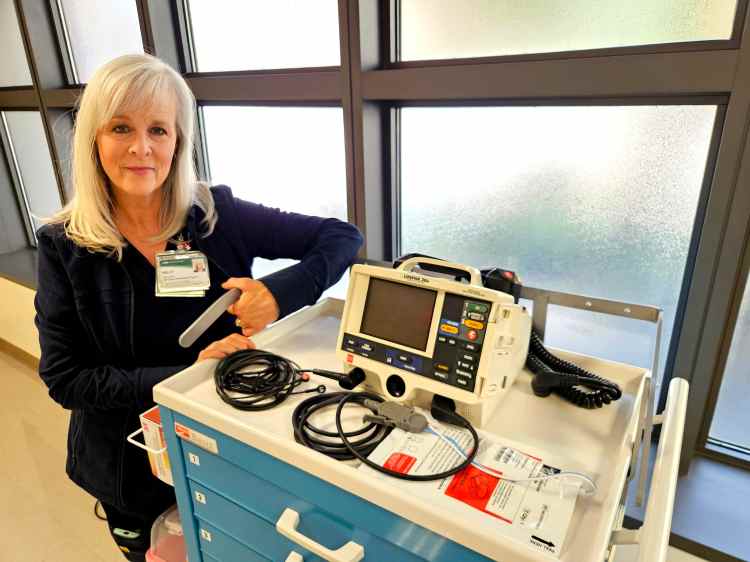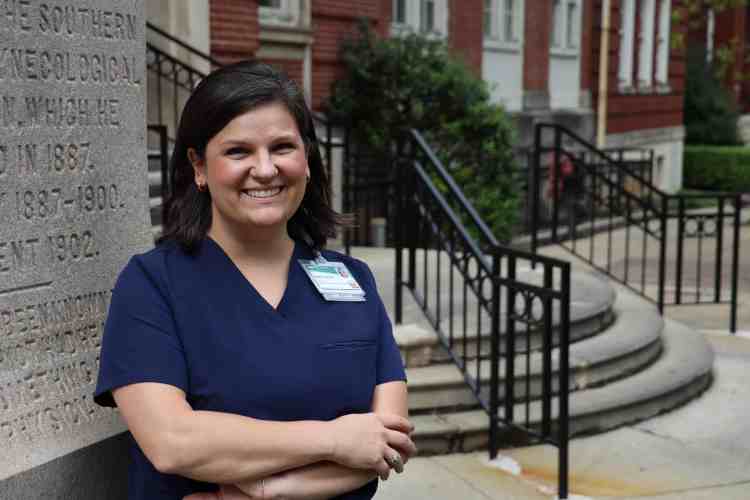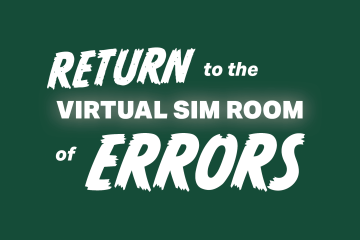Sim First Award honors inaugural recipients for excellence in simulation
UAB Clinical Simulation has announced the first recipients of its new Sim First Award—Kelly Wertz and Mary Grace Cox—recognizing their lasting contributions to simulation and their impact across the health system.
Launched in 2025, the Sim First Award celebrates “friends of simulation” who create transformative learning experiences, model strong facilitation and collaboration, and foster safe, inclusive environments. Recipients are nominated by members of the Clinical Simulation team and selected annually near the conclusion of the fiscal year.
“The Sim First Award honors those who embody the spirit of collaboration and continuous learning that simulation was built on,” said Marjorie Lee White, M.D., MPPM, M.A., vice president of UAB Clinical Simulation. “Kelly and Mary Grace have each strengthened our program in distinct but equally meaningful ways through their passion, expertise and unwavering commitment to helping others grow.”
Kelly Wertz: Elevating Learners through RCDP

As a skilled facilitator and clinical development specialist, Kelly Wertz has become a trusted leader in Rapid Cycle Deliberate Practice (RCDP), leading sessions both on campus and at offsite clinics. Known for her ability to provide direct, timely feedback, Wertz keeps learners engaged through fast-paced, repetitive practice that yields visible improvement in real time.
Her nomination cited her command of the RCDP feedback structure, her mentorship of novice facilitators and her ability to foster a psychologically safe, inclusive environment. Through this work, she embodies the very values that define the Sim First Award.
For Wertz, the recognition holds deep meaning.
“Receiving the inaugural Sim First Award means a lot to me personally,” she said. “Facilitating this training is something I genuinely look forward to. It’s one of the best parts of what I do. There’s often fear and insecurity around responding to a Code Blue emergency, and these sessions allow staff to walk through those steps in their own environment, with their own equipment. They learn how to take the correct steps and in the most efficient manner, which promotes higher-quality patient outcomes.”
Wertz’s approach to facilitation focuses on engagement and empathy. To help learners overcome anxiety, she works to lower stress from the very start.
“Many of them may never have been in a Code Blue situation, and there is no expectation that they know ‘all the things,’” she said. “They are told that we’re there to practice skills that we recognize they have little exposure to. This is the very reason we provide the training.”
For her, the most rewarding moments come when confidence replaces apprehension.
“I remember two learners who froze at the start; they didn’t even know where to begin,” she recalled. “They stood in the room and did not move in any direction and looked at me with a look of pure stress and embarrassment. By the end of the session, they were shocking within two minutes of the patient being found. They walked out with a look that said, ‘I really can do this!’ I walked away feeling so grateful to have been a part of this training and to see how proud they were of what they had accomplished.”
Wertz’s belief in simulation’s impact extends beyond skill training.
“Simulation is by far the most powerful learning tool for developing skills,” she said. “It also lets us teach the why behind what we do, helping participants process at a higher level. For me, creating opportunities for participants to put (didactic) learning and hands-on skills together promotes the highest form of lasting and impactful learning.”
She expressed deep gratitude for the collaboration that makes this work possible.
“Partnering with the simulation team has been wonderful,” she said. “From facilitator training to the on-site support and brainstorming new ideas, the collaboration has been invaluable. Together, we’re promoting learning, cultivating skills and improving safety for our patients.”
Mary Grace Cox: Harnessing Data to Tell the Simulation Story

While Wertz strengthens simulation through facilitation, Mary Grace Cox, Senior Director of Clinical Effectiveness and Analytics with UAB Medicine, advances it through data—helping the team translate information into insight and insight into impact.
Cox has been one of Clinical Simulation’s strongest champions, devoting countless hours to organizing, refining and developing the data that drives improvement, awareness and growth.
Her partnership has elevated the program’s ability to demonstrate its impact, strengthen decision-making and broaden awareness of simulation’s essential role in improving patient care.
“Data is essential to telling the story of any meaningful work,” she said. “Simulation can sometimes feel a bit abstract or hard to quantify, but data helps make its impact clear. By measuring outcomes and sharing results, we can show how simulation strengthens clinical practice, improves teamwork and drives change across the organization. It turns something that might otherwise be viewed as ‘nice to have’ into something undeniably essential.”
Her approach, Cox explained, is about more than spreadsheets and dashboards.
“For me, it’s all about making the data work for the people who use it,” she said. “When information is thoughtfully aggregated and displayed, it can reveal powerful insights about processes and strategies. I focus on distilling complex datasets into clear, meaningful stories that help the team see where they can grow, adjust or innovate to better serve their learners and stakeholders.”
To Cox, simulation’s value lies in its ability to bring best practices to life.
“It creates space for multidisciplinary teams to come together, practice in real-world scenarios and refine their approaches in a safe environment. One of its greatest strengths is the way it fosters a psychologically safe space for learning—where participants can make mistakes, reflect and grow without fear of judgment. That kind of environment encourages honest dialogue and deeper learning, which ultimately translates into better teamwork, stronger clinical practice and improved patient care across the institution.”
Her collaboration with Clinical Simulation, she added, has been a highlight of her work at UAB Medicine.
“Honestly, it’s been such a joy,” Cox said. “I love working with data, but what really energizes me is seeing how that data can empower a team to do their best work. The simulation team is incredibly dedicated and innovative, and being part of their journey—helping them refine their processes, strengthen their programs and share their story—has been deeply rewarding. There’s something special about working behind the scenes to support a group that’s making such a meaningful impact. It’s the best blend of what I love: problem-solving through data and enabling others to shine.”
Celebrating a Culture of Excellence
By honoring both Kelly Wertz and Mary Grace Cox with the inaugural Sim First Award, UAB Clinical Simulation reaffirms its commitment to transformative learning, collaboration and innovation.
Their work—one through facilitation, the other through analytics—illustrates the many ways people across UAB Medicine contribute to a shared goal: advancing health care through safer, smarter and more compassionate practice.
UAB Medicine’s Clinical Simulation program offers opportunities for individuals and teams across UAB Medicine and beyond to practice before they deliver care. We encourage all who provide and support patient care to “Sim First.” Together, we can put our patients’ safety first.




0 Comments